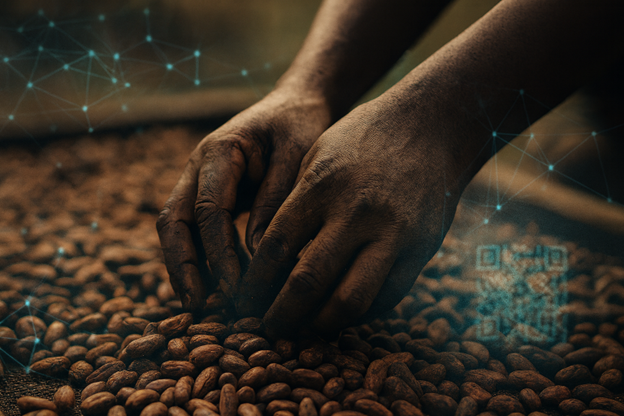Ten-year-olds still swing machetes on Ghanaian cocoa farms that feed global chocolate giants. After decades of industry promises, over 1.5 million children work in conditions that would be illegal anywhere else.
Swiss blockchain firm Fedrok AG and Ghanaian agribusiness FarmRight Ghana have launched a pilot designed to help prevent child labor from cocoa and palm oil supply chains. The initiative marries Fedrok’s “Proof-of-Green” blockchain with FarmRight’s deep-rooted credibility among Ghanaian farmers, creating a system that aims to be transparent, tamper-proof, and, most importantly, scalable.
The initiative targets a problem that has persisted despite years of industry commitments. Ghana produces approximately 20% of global cocoa, yet investigations continue to find young children working in dangerous conditions on supplier farms.
“Transparency is the key to ending child labor, and blockchain can deliver that,” said Dr. Philip Blazdell, Fedrok’s CEO.
Here’s how it works in practice. When farms hire workers, they scan palm veins for identification. To verify ages, the data is compared with government records. Once on the blockchain, the data itself is immutable, but the integrity of the system depends on the integrity of this initial, on-the-ground process to prevent fraudulent records from entering the system.
Every employment contract gets permanently recorded on Fedrok’s blockchain. Independent and surprise audits get logged with digital signatures and timestamps. Anonymous community tips get stored where they can’t disappear. Most importantly, farms that prove they’re child-labor-free gain a blockchain-verified “seal” that grants them access to premium buyers who are willing to pay more for ethically sourced cocoa. This economic reward, rather than a top-down mandate, is what could make this initiative sustainable where others have faltered.
“It’s not enough to tell farmers to do better,” Randy Boaitey, founder of FarmRight Ghana explained. “We’re making sure that doing better actually pays.” The long-term viability, however, will hinge on farmers seeing a clear return on the necessary initial investment in the technology, which includes biometric scanners, training, and reliable internet connectivity in remote areas, with offline/low-bandwidth workflows for patchy coverage.
This matters because regulation is coming whether companies like it or not. The European Union’s Deforestation Regulation will soon require companies to prove their supply chains are free from human rights abuses and environmental damage. The upcoming Corporate Sustainability Due Diligence Directive extends these requirements further. Companies caught with child labor in their chains face massive fines and market exclusion. Nestlé, Mars, and Mondelez have all made public commitments to stop child labor from their supply chains. However, progress has been slow and verification difficult.
The system utilizes Fedrok’s Layer-1 blockchain, an EVM-compatible blockchain that is optimized for high-frequency ESG data logging. In addition to handling multiple compliance frameworks, the infrastructure integrates with existing certification systems.
Fedrok takes a different approach from most crypto companies. Instead of engaging in speculative trading, they solely concentrate on environmental and social impact. CEO Blazdell calls himself a ‘systems engineer,’ not a ‘crypto entrepreneur.’
The company’s “Proof-of-Green” consensus mechanism rewards blockchain activity powered by renewable energy. Their FDK token links on-chain activities to measured environmental impact by reflecting certified carbon results. Fedrok has earned ISO 9001 and ISO 14001 certifications and applied for membership with VQF, a FINMA-recognised self-regulatory organisation (SRO) under Switzerland’s AML Act. This compliance-first approach targets institutional clients demanding verifiable sustainability credentials.
“We’ve long fought for organic and sustainable farming,” Boaitey said. “Now we have a tool that gives proof of fairness to the world.”
Ghana represents one front in Fedrok’s global expansion. In India, the company partners with TechXEarthSpace on underground CO2 sequestration projects. In Papua New Guinea, their T4G Pay platform enables indigenous landowners to receive verified payments for mangrove restoration. In Madagascar, they’re piloting “Cash for Trash” programs that transform community recycling into tradeable digital assets.
For Ghana’s cocoa industry, the experiment represents a test of whether technology can succeed where traditional oversight has failed. Plans include partnerships with government ministries and certification bodies. Shoppers might soon scan QR codes to verify their chocolate came from verified child-labor-free farms. The country’s 800,000 employed farm families could gain access to premium markets and carbon financing if the system proves scalable.
If successful, the model could extend beyond Ghana to other cocoa-producing regions in West Africa and to additional crops where child labor remains endemic. The blockchain infrastructure is designed to be replicable across different countries and regulatory frameworks.
Whether this finally solves a problem that has resisted decades of corporate promises remains to be seen. Traditional oversight failed because it was expensive, infrequent, and easy to manipulate. On-chain records are constant and tamper-evident, the cost driver is field verification and making sure bad data can’t enter in the first place.
The children working Ghana’s cocoa farms have heard plenty of promises before. This time, the verification system doesn’t rely on trust. It runs on math, cryptography, and economic incentives that make protecting children more profitable than exploiting them.
If it works, chocolate might finally taste sweeter.
DisClamier: This content is informational and should not be considered financial advice. The views expressed in this article may include the author's personal opinions and do not reflect The Crypto Basic opinion. Readers are encouraged to do thorough research before making any investment decisions. The Crypto Basic is not responsible for any financial losses.



